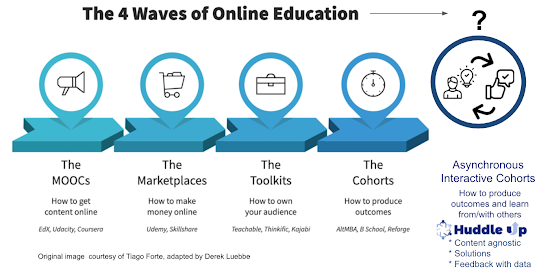The pandemic has made everyone far more knowledgeable about online learning platforms than they were 24 months ago. We each know (and feel) the strengths and the limitations of more than a few platforms.
We each have a long and growing list of features we want to see in the next evolution of online learning. So, it seems a rather good time to step back and explore the evolution of online learning - to see how far we've come, and where we might be heading.
One of the best resources out there is a simple progression chart shared in this intriguing article by Tiago Forte.
The Future of Education is Community: The Rise of Cohort-Based Courses
The evolution of online learning: What's next?
One thing is certain. Change is really the only constant. It's an exciting time in the world of online learning. While it's safe to say that no one can predict the future, the major themes are becoming clear.
- Relevant, product-focused experiences are needed instead of recall, quizzes, and compliance.
- Interactive, social learning is far more engaging than isolating experiences.
- Contextual learning is replacing right/wrong.
- We learn from feedback as we give and receive it.
- Dynamic learning communities connect people.
- Asynchronous experiences give learners flexibility.




Comments
Post a Comment